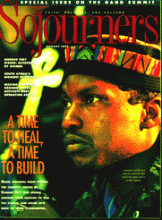Church music committees are always seeking worship songs that can enrich the liturgical life of the church. A sampling of a few such recordings follows.
Diversity and Heritage
Global Songs, Local Voices (1993, Division for Global Mission, ELCA Distribution Center, 8765 West Higgins Road, Chicago, IL 60631) is a recording of powerful music from various cultures produced by a group of musicians for Evangelical Lutheran Church of America (ELCA) mission events. With music from each continent, GSLV offers a diversity that demonstrates the universality, as well as the particularity, of the church. It is reminiscent of the Swedish recording that made South African freedom songs so popular within the church and movements for social justice in the United States.
This live recording opens with a beautiful Zimbabwean hymn of worship, "Uyai mose." On it and on "Cántalo," an evangelistic popular tune from Argentina, the crowd's enthusiasm demonstrates the potency of song.
"The Earth Is the Lord's" is a powerful Filipino hymn that catches both a commitment to the Creator and a concern for the created. Similarly, "For the Beauty of the Earth" has been arranged with a Chinese melody, which fits well the lyrics of the hymn.
My favorite offering is "Mold Me, Lord," a Tanzanian tune written in call-and-response style. In the tradition of African-American spirituals, this song's message reassures us of a God who is with us and reshapes us over and over again.
Other songs come from El Salvador, Sweden, Cameroon, the Caribbean, and Peru. Even a couple of North American songs are interjected, including "A Song of Joy," a hopeful and upbeat song written by group member Bret Hesla.
Read the Full Article

